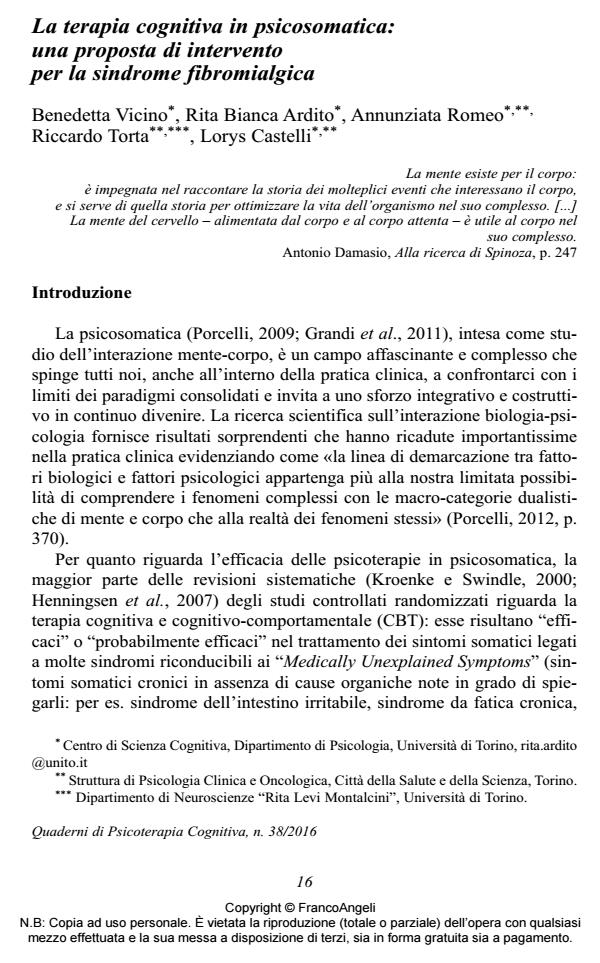Cognitive therapy in the psychosomatic setting: a treatment’s proposal for fibromyalgia syndrome
Journal title QUADERNI DI PSICOTERAPIA COGNITIVA
Author/s Benedetta Vicino, Rita Bianca Ardito, Annunziata Romeo, Riccardo Torta, Lorys Castelli
Publishing Year 2016 Issue 2016/38
Language Italian Pages 15 P. 16-30 File size 119 KB
DOI 10.3280/QPC2016-038002
DOI is like a bar code for intellectual property: to have more infomation
click here
Below, you can see the article first page
If you want to buy this article in PDF format, you can do it, following the instructions to buy download credits

FrancoAngeli is member of Publishers International Linking Association, Inc (PILA), a not-for-profit association which run the CrossRef service enabling links to and from online scholarly content.
Fibromyalgia is a somatic functional syndrome characterized by widespread muscoloskeletal pain, stiffness, sleep distrubances, fatigue; there is often a comorbidity with anxiety and depressive disorders; the course of fibromyalgia is generally chronic. Although the etiology is still unclear, the hypothesis is that several factors may be involved (biological, psychological and socio-cultural factors). Abrief psychotherapeutic intervention should identify and treat the psychological factors that are relevant for the specific patient, with the aim to improve global functioning and quality of life. This paper aims to be a guide for therapists approaching fibromyalgic patients. The proposed psychotherapeutic intervention is composed by three main steps: the first step is dedicated to build up a working alliance; the second one aims at approaching the affective world (auto-observation and affective regulation); the third step aims at promoting an active role of patient, increasing his/her resources. Finally we introduce a clinical case, Anna’s case, a 60 years old woman who has been suffering from chronic pain since the age of 13.
Keywords: Fibromyalgia, psychotherapy, brief intervention, somatic functional syndrome, chronic pain
- Una lettura gestaltica dei disturbi psicosomatici: "la pelle che brucia" Michele Cannavò, Dario Davì, Brenda Cervellione, in QUADERNI DI GESTALT 2/2024 pp.33
DOI: 10.3280/qg2024-2oa18163
Benedetta Vicino, Rita Bianca Ardito, Annunziata Romeo, Riccardo Torta, Lorys Castelli, La terapia cognitiva in psicosomatica: una proposta di intervento per la sindrome fibromialgica in "QUADERNI DI PSICOTERAPIA COGNITIVA" 38/2016, pp 16-30, DOI: 10.3280/QPC2016-038002